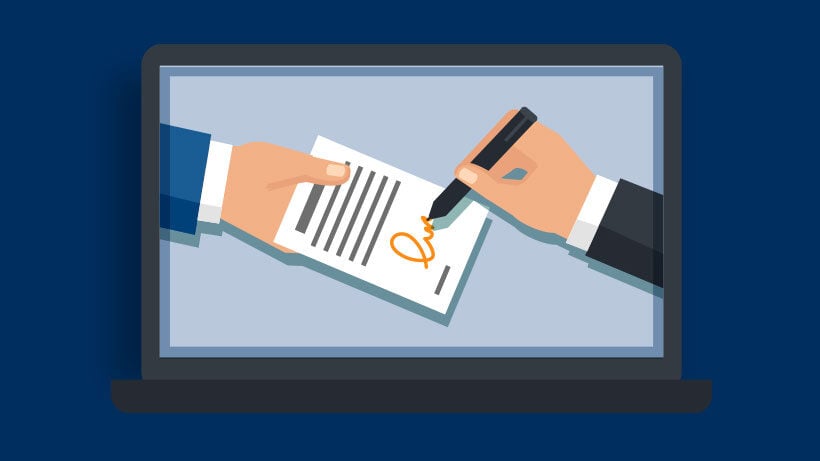Can a company achieve resilience with CRM as a foundation?
Published: February 20, 2025
Last update: August 4, 2025
Driven by the COVID-19 pandemic, companies around the world are looking for new ways to generate revenue and compete. While some companies are succeeding, others are struggling. The question is which business models will prove to be resilient in the long term. Which models are currently successful and can you achieve resilience with CRM software as a foundation? We explore these questions in the following blog article.

Expert
Lars Bolender, Head of Sales & Marketing
Gedys Intraware GmbH
Table of contents
Which business models have proven to be resilient during the coronavirus crisis?
According to the BDI Quarterly Report III 2020, at the beginning of the COVID-19 crisis, the German economy experienced the sharpest slump since quarterly accounting began in 1970. However, it was able to recover much faster than the economy in other countries because, according to the Tagesspiegel, the shutdown was shorter, short-time working was used, Germans remained comparatively mobile, the state's financial cushion was larger and the German government put together a rescue package faster than other governments. However, these reasons are not a good explanation for why some companies were more successful than others.
In the very first phase of the crisis, many companies were forced to fundamentally change the way they worked. The lockdown with exit restrictions necessitated a far-reaching switch to working from home, which in turn brought with it new working practices and new ways of communicating. Due to the contact restrictions, a number of companies had to switch to contactless delivery models ora hybrid constellation (online ordering with collection on site or at a packing station). New structures and suitable tools had to be found at short notice.
In the next stage, the economy was affected by travel restrictions around the world, workers were unable to get to their place of work, supply chains were interrupted and machines came to a standstill. With the use of video conferencing tools and remote software, companies were able to replace on-site visits and maintenance work was also possible. When offices and production facilities were finally allowed to reopen, people returned to their workplaces. Analyses and evaluations were now required to assess the situation.
Most companies realized that processes that had previously worked had suddenly become unusable. However, only those companies that changed their way of thinking were able to create new products, services and business models by asking themselves: “What if we could solve this problem in a completely different way?”.
This innovative strength, the ability to organize employee collaboration from different locations and the fact that they had sufficient financial reserves, an efficient IT department or an appropriate IT service provider with cloud offerings were the decisive factors for rapid adaptation to the new conditions and therefore the key to success.
Business models that have worked well since the coronavirus crisis:
Online retail:
Selling & delivering goods or services directly to end consumers (= B2C such as Amazon, Zalando, but also Edeka, Rewe etc.). )Hybrid distribution:
Selling products or services online to business customers (= B2B), delivery contactless or remote installation, where possible also on-site delivery in compliance with hygiene regulationsServices that use the internet for themselves:
- Delivery services (such as Lieferheld, Hellofresh or Flaschenpost)- Sales platforms (such as ebay, Etsy, Rakuten)
- Booking platforms (such as Airbnb, booking.com, myticket.de, eventim. de)
Online services:
- Streaming or gaming services (such as Netflix, Prime, Sky)- Cloud and hosting services (such as Microsoft, Hetzner, Raidboxes, 1&1, Gedys Intraware)
Manufacture of digital consumer goods:
- Hardware such as tablets, smartphones, laptops, etc. Tablets, smartphones, laptops (such as Apple, Samsung, Xaomi)- Software such as games and apps (such as FIFA, Fortnite, Houseparty, WhatsApp, Instagram)
Software development (including licenses and services)
Management consultancy
Outdoor sales and event models:
- Mobile sales stands, mobile test centers- Catering businesses with outdoor seating
- Events in outdoor areas (e.g. concerts with sufficient distance between participants and admission controls)
What are the prerequisites for resilience in companies?
The word resilience generally refers to the ability to cope with crises, while the term business resilience refers to the ability of an organization to recover from any kind of disruption and continue to operate efficiently. A company is normally considered resilient if its performance does not deteriorate during a period of crisis, which may last several months. However, being able to maintain the current state of a company for a manageable period of time is not enough to survive in the long term today, as cut-throat competition is too great.
Those who see crises as opportunities can emerge from them stronger. This is also made clear in the Resilience Check 2020 by Microsoft and the Confederation of German Employers' Associations (BDA).
According to Microsoft, these factors playa major role:
- Adaptability of the organization
Companies have introduced new ways of working during the coronavirus pandemic and have become more flexible.
Keyword
According to the report, the most important prerequisites for resilience are the will to change and adapt to new circumstances as well as the willingness to make changes in and with all departments of the company.
Added to this is the (not exactly easy) task of recognizing trends at an early stage and reacting to them or, even better, becoming a trendsetter yourself and staying ahead of others. Even if these are very small niches that could be developed: A company's success depends on whether it is willing and also able to take risks in order to find new markets and customers. This requires a certain degree of creativity, flexibility and courage. However, it also requires a great deal of dedication, commitment and continuous reflection.
How can you improve your company's ability to adapt to change?
In the past, management determined which tasks a company would take on, which goals it would pursue and which resources it would need to do so. Today and in the near future, however, the customer determines which tasks a company performs.
To achieve resilience, you therefore not only need a resilient infrastructure throughout the organization - i.e. management, employees, machines and IT as well as the right connections and processes in between - but also the ability to adapt to changing customer needs and expectations. A key factor in building a resilient business model is a strong understanding of how customers interact with your business.
Companies that opened up new channels of communication with their customers before the crisis were able to use them effectively during the pandemic, especially online. According to Bitkom, those who had invested in long-term customer relationships were also able to benefit, as loyal customers were willing to support their providers. This was clearly demonstrated by the example of many sports studios, whose members continued to pay even though they were unable to use their fitness clubs.
It is therefore imperative to take a close look at your own customer loyalty model and previous customer approach and to check where and how optimization is possible. By using customer relationship management software, or CRM for short, you can gain valuable insights into what your customers expect and need from your product or service. With this information, you can develop a better product or service for them, increasing your chances of long-term success.
Of course, even software can't predict consumer behavior one hundred percent, but you can use aCRM system to get an overview of past behavior and draw conclusions from it. And if you use the CRM system to keep an eye on online and offline channels and use automation, you will be able to meet demand more efficiently.
How do you build resilience with CRM as a basis?
If you want your organization to come through the next crisis in excellent shape, you first need to review and understand your current situation. Have you ever put everything to the test and included not only your own department, but all departments in the company? Then you will have an idea of how much energy you had to expend on this.
A CRM system is also very useful here. Important information from your company is stored there on a daily basis and can be called up and evaluated at any time. By integrating your ERP system and connecting additional channels and sources, you can use further data for analysis. This allows you to see which channels interested buyers used to reach you, which leads became customers and which products or services were successful or not.
If you need more in-depth information from your customers or employees, surveys can provide you with important insights. You can conduct these either via your website, your newsletter or a survey tool. The results can be collected, linked, graphically displayed and reported in the CRM system. This gives you a first-data basis that you need to uncover your potential so that you can then develop innovative products that precisely meet your customers' needs.
Well-maintained data is a prerequisite for being able to fully exploit the possibilities of a CRM. The CRM supports you with data imports, matching with address databases, sanctions lists, duplicate checks and the complete documentation of your correspondence, campaigns, newsletters and mailings as well as the filing of various documents and attachments for your processes.
The CRM system becomes the"source of truth"for sales, marketing and service. At the same time, it promotes optimal collaboration between teams with end-to-end transparency for processes and contact persons as well as time-saving workflows - even with agile working methods. It makes your employees' work easier and collects valuable information that you can use to identify deviations and determine the causes and background. Insights that you can use as a basis for gradually improving the resilience of your company. Your successful path to resilience with CRM.
What a CRM system can do for your company
Conclusion:
Now you know why CRM systems are so important for companies and that resilience is possible with CRM as a foundation. CRM software helps you to learn more about your customers' wishes, work more effectively, save time, adapt more quickly to new circumstances and therefore be more resilient in the long term.
Is your current CRM system not sufficient or do you not yet have a CRM at all?
Benefit from our know-how and experience. Our CRM experts are available to answer your questions about resilience with CRM. If you are not yet using CRM, we also recommend downloading our free e-book on CRM implementation:



